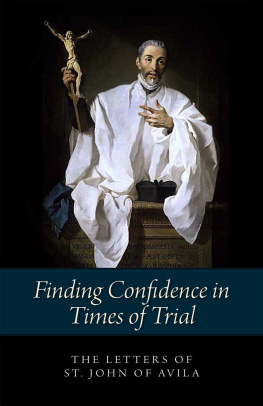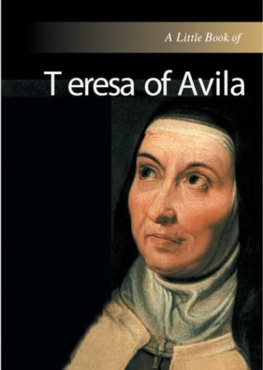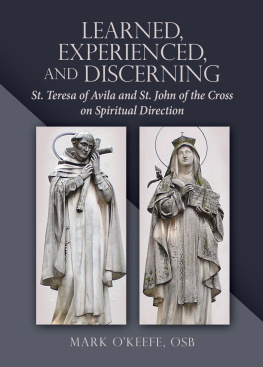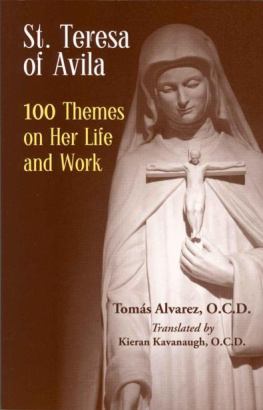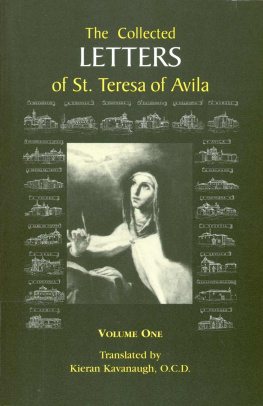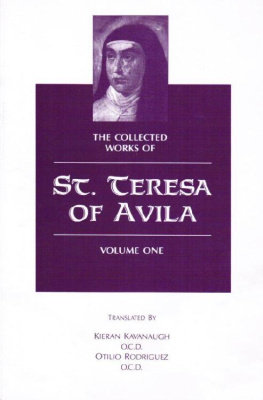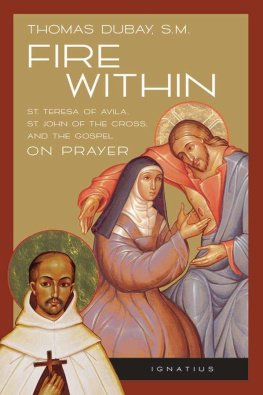John of Avila - Finding Confidence in Times of Trial: Letters of St. John of Avila
Here you can read online John of Avila - Finding Confidence in Times of Trial: Letters of St. John of Avila full text of the book (entire story) in english for free. Download pdf and epub, get meaning, cover and reviews about this ebook. year: 2013, publisher: Sophia Institute Press, genre: Religion. Description of the work, (preface) as well as reviews are available. Best literature library LitArk.com created for fans of good reading and offers a wide selection of genres:
Romance novel
Science fiction
Adventure
Detective
Science
History
Home and family
Prose
Art
Politics
Computer
Non-fiction
Religion
Business
Children
Humor
Choose a favorite category and find really read worthwhile books. Enjoy immersion in the world of imagination, feel the emotions of the characters or learn something new for yourself, make an fascinating discovery.
- Book:Finding Confidence in Times of Trial: Letters of St. John of Avila
- Author:
- Publisher:Sophia Institute Press
- Genre:
- Year:2013
- Rating:5 / 5
- Favourites:Add to favourites
- Your mark:
- 100
- 1
- 2
- 3
- 4
- 5
Finding Confidence in Times of Trial: Letters of St. John of Avila: summary, description and annotation
We offer to read an annotation, description, summary or preface (depends on what the author of the book "Finding Confidence in Times of Trial: Letters of St. John of Avila" wrote himself). If you haven't found the necessary information about the book — write in the comments, we will try to find it.
John of Avila: author's other books
Who wrote Finding Confidence in Times of Trial: Letters of St. John of Avila? Find out the surname, the name of the author of the book and a list of all author's works by series.
Finding Confidence in Times of Trial: Letters of St. John of Avila — read online for free the complete book (whole text) full work
Below is the text of the book, divided by pages. System saving the place of the last page read, allows you to conveniently read the book "Finding Confidence in Times of Trial: Letters of St. John of Avila" online for free, without having to search again every time where you left off. Put a bookmark, and you can go to the page where you finished reading at any time.
Font size:
Interval:
Bookmark:
Finding Confidence
in Times of Trial
Letters of St. John of Avila
Translated and Selected from the Spanish
by the Benedictines of Stanbrook Abbey
Preface by the
R.R. Abbot Gasquet, O.S.B.
SOPHIA INSTITUTE PRESS
Manchester, New Hampshire
Finding Confidence in Times of Trial: Letters of St. John of Avila was originally published under the title Letters of St. John of Avila in 1904 by Burns and Oates, Ltd., London. This 2012 edition by Sophia Institute Press includes minor revisions.
Copyright 2012 Sophia Institute Press
Printed in the United States of America
All rights reserved
Cover design by Carolyn McKinney
On the cover: Juan de Avila, c. 1746 (oil on canvas),
by Pierre Subleyras. Birmingham Museums and
Art Gallery / The Bridgeman Art Library.
Sophia Institute Press
Box 5284, Manchester, NH 03108
1-800-888-9344
www.SophiaInstitute.com
Sophia Institute Press is a registered trademark of Sophia Institute.
Contents

Preface
Preface

This little volume contains the translation from the Spanish of a few spiritual letters of St. John of Avila. The author is probably not much known to English readers; certainly he is not as well known as he deserves to be both for his own merits as a writer and because in his own time, the sixteenth century, and even beyond the limits of his own country, Spain, he was a man of great renown. He was recognized everywhere as a special servant of God, and as a true director of all souls desiring to walk the higher paths of perfection, or of those who needed help and encouragement to serve God in the humbler walks of life.
He was also a preacher of exceptional power. St. Francis of Sales as the Great Master, and he was popularly known as the Apostle of Andalusia from the wonderful change his preaching wrought in that district of Spain. His discourses were likened to fishermens nets gathering in fishes of all sorts whenever and wheresoever he cast them, so plentiful was the harvest of souls that followed his expositions of the Christian teaching.
It may perhaps seem somewhat strange that one endowed by God with such personal holiness and who had been called to guide the souls of St. John of God, St. Francis Borgia, St. Peter of Alcantara, and St. Teresa The writings of the great servant of God have hitherto been little known, at least in England, and it is with the confident expectation that those who will read the letters here printed will find in them spiritual comfort and solid Christian teaching, that they have been translated from the Spanish.
For the sake of those into whose hands this little volume may fall, who are unacquainted with the life of St. John of Avila, it may be useful to give a brief outline of his career. Letters and other writings of anyone wholly unknown to us do not as a rule interest us as much as when we have at least a general knowledge of their author and of the circumstances under which they were written. From a contemporary historian we learn that our author was born on January 6, 1500, at Almodovar del Campo, a town in the diocese of Toledo and in the kingdom of New Castile. Spain was then under the rule of Ferdinand and Isabella, and the Church was governed by Pope Alexander VI.
The parents of St. John of Avila were people in a good social position and able to give him an excellent education, but more important than this, they were both truly and solidly pious. In fact, their son was given to them in their old age when they had ceased to hope for children, as the direct result of prayer during a pilgrimage made in honor of St. Bridget.
From his early boyhood, St. John of Avila manifested signs of extraordinary piety, and it required little discernment to see that God had destined him for some special service in the Church. At the age of fourteen he had finished his literary studies and as, in the opinion of his masters, he gave promises of a distinguished career, his father sent him to the University of Salamanca to study law. After a twelvemonth spent in the legal schools, however, he manifested such a distaste for secular studies that his father allowed him to return home. The next three years were spent almost entirely in the seclusion he made for himself, with the consent of his parents, in his fathers house, and in which he devoted himself to the practice of penance and to the study of the science of the saints with our Lord and His Blessed Mother as his chief teachers.
At the end of this period of retirement, by the advice of a friend, he determined to prepare for the priesthood. With this intention he went to Alcala to commence his philosophy and theology, which he was fortunate enough to be able to study under the celebrated Dominican professor de Soto, who formed the highest opinion both of his abilities and of his exemplary piety. While here, he formed a lasting friendship with Don Pedro Gerrero, who afterward became Archbishop of Granada and to whom several of his letters are addressed.
Before he had finished his philosophical course, both his parents died. He remained on at the university until his studies were sufficiently advanced for him to receive the sacred Order of Priesthood, when he returned home to say his first Mass in the church wherein his two parents were buried. After this, he disposed of his family property and gave the proceeds to the poor. The desire of his heart inclined him to the missions in Mexico and, having no family ties and having dispossessed himself of all his belongings, he seemed to see in his circumstances an indication of the divine will in his regard. He consequently made all preliminary arrangements and repaired in 1527 to Seville to await an opportunity of setting out for the scene of his mission. Meantime his days and nights were spent in prayer and penance and in filling his mind with that heavenly learning which only constant communing with God Himself can impart.
The design formed by St. John of Avila of leaving Spain to work in the Mexican missions was not, however, destined to be carried out. At the beginning of 1528, he was induced by ecclesiastical authority to renounce the idea in order to assist in evangelizing the province of Andalusia.
His first sermon was preached on July 22, 1529. He had looked forward with dread to the ordeal of facing an audience and speaking to them of the high mysteries of God and of their duties as Christians. As he mounted the pulpit, his nervousness for a few moments deprived him of the power of speech, until he remembered that it was Gods work, undertaken only for His sake, and raising his mind and soul to heaven he said: My God, if it be Thy will that I should preach, remove from me this great confusion I am feeling. Do this, I beg Thee, by the memory of Thy bitter Passion, for Thou knowest whether I seek aught else but Thy glory and the salvation of souls. At once his nervous distress passed away, and he became one of the most eloquent and successful preachers that Spain has ever seen.
Next pageFont size:
Interval:
Bookmark:
Similar books «Finding Confidence in Times of Trial: Letters of St. John of Avila»
Look at similar books to Finding Confidence in Times of Trial: Letters of St. John of Avila. We have selected literature similar in name and meaning in the hope of providing readers with more options to find new, interesting, not yet read works.
Discussion, reviews of the book Finding Confidence in Times of Trial: Letters of St. John of Avila and just readers' own opinions. Leave your comments, write what you think about the work, its meaning or the main characters. Specify what exactly you liked and what you didn't like, and why you think so.

